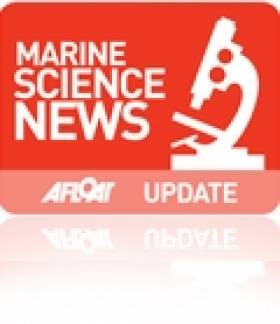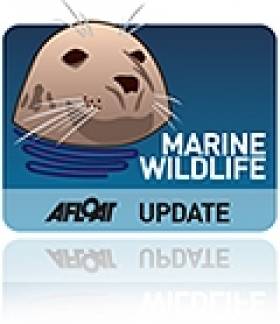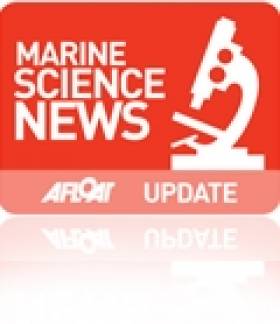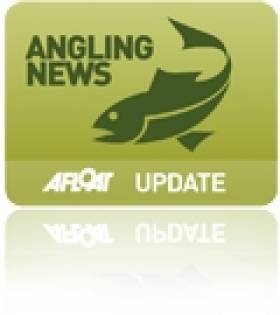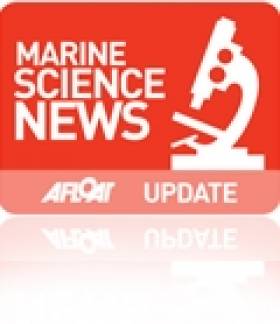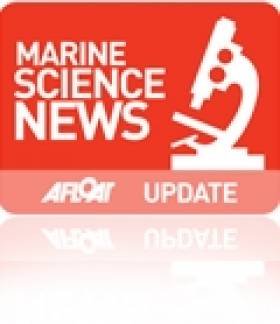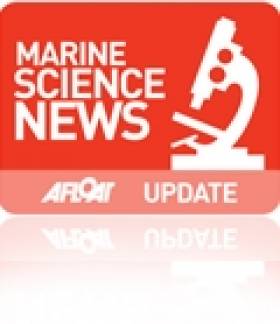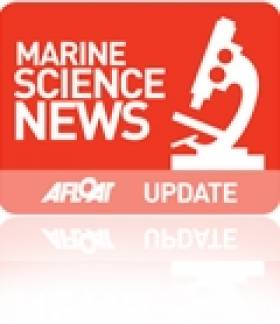Displaying items by tag: research
Marine Researchers Brave Elements For Workshop On Cross-Cutting Opportunities In EU Funding
#MarineScience - More than 60 marine researchers from third level institutes, Government agencies and SMEs braved the elements to get to the Marine Institute in Oranmore on Thursday 7 January for information and advice on the many EU funding opportunities for marine research.
The workshop – titled Cross Cutting Marine Opportunities in EU Funding, as previously reported on Afloat.ie – was organised by the Marine Institute’s Research Office.
Welcoming participants, John Evans, director of policy, innovation and research at the Marine Institute, highlighted the success of Ireland’s marine researchers to date in winning competitive EU funding.
“Irish researchers have won 3.6% of the available funding for Blue Growth topics under the most recent round of results announced by the European Commission for Horizon 2020 Societal Challenge 2, and this rises to 4.6% when marine related topics relating to sustainable food security are considered," he said.
"This is becoming a consistent pattern, with Irish marine researchers winning more European competitive funding than would be expected from a country our size.”
Evans also spoke of the need for a focus on national research collaboration to maintain and improve this competitive position, and the importance of relevant national strategies as tools for researchers preparing funding proposals, specifically Harnessing Our Ocean Wealth – An Integrated Marine Plan for Ireland, and the National Strategy for Science, Technology and Innovation 2015-2020.
The Marine Institute's Dr Fiona Grant, national contact point for marine aspects of Horizon 2020 Societal Challenge 2, gave an overview of the priority topics for Blue Growth with a total of €148.5m available funding with contributions from the Climate, Energy and Transport parts of the Horizon 2020 programme.
'Linking healthy oceans and seas with healthy people’ was one of the key topics covered. Dr Grant mentioned the concept of the ocean as a "blue gym", citing a recent European Marine Board position paper that shows the significant impact of the oceans on human health and wellbeing.
Dr Sean McCarthy of Hyperion Ltd gave very practical advice on how to write a competitive Horizon 2020 proposal, with lots of insights for both new and experienced funding applicants. He told scientists to focus on the potential impact of the research proposal.
“Begin your proposal with impact – the impact is the big issue. Then write the science around the impact,” he said.
Other advice from Dr McCarthy included contacting the national contact point to ensure a better success rate.
“When writing your proposal it’s important to understand how the research priorities have been selected and the national contact point can give you insight into this,” he added.
Gerry Finn, director of the Northern and Western Regional Assembly and national contact point for the INTERREG Atlantic Area, gave an overview of the INTERREG Atlantic Area Programme 2014-2020 and success stories from the 2007-2013 ERDF programmes., under which €12.9m in ERDF funding was approved to 56 Irish projects.
Also speaking on the day was Michael O’Brien, EU Programme liaison officer, who gave an overview of eligibility criteria and guidelines on what makes a successful proposal under this financing mechanism. Four priority areas have been identified which include:
- Stimulating innovation and competitiveness.
- Fostering resource efficiency.
- Strengthening the territory’s resilience to risks of natural, climate and human origin.
- Enhancing biodiversity and the natural and cultural assets.
Over €140m will be available under the call from 2014-2020 which is expected to be launched in the middle of 2016.
O’Brien advised that the technical parameters "are not formally agreed yet by the member states and there may be further changes over the coming weeks. The working group for the programme meets again shortly to advance the progress on the programme manual and application process.”
Irish Labs Exploring Future Of Ocean Energy
#OceanEnergy - Not only the subject of a new Irish-authored research paper, Ireland's ocean energy potential is the focus of an in-depth feature this week on Silicon Republic that highlights five research labs in Ireland's renewables sector.
Among them are the Lir National Ocean Test Facility at UCC's Beaufort Centre, with its state-of-the-art wave simulators, and the Centre for Ocean Energy Research based at Maynooth University, which has an on-campus wave tank for testing its mathematical simulations of ocean energy devices.
And there's also the Litmus Technology Trialling Centre, part of the Nimbus Centre at the Cork Institute of Technology devoted to connected technologies, which has developed a 'smart kite' now being used by the Naval Service to boost ships' speed and generate power while at sea.
Silicon Republic has much more on the story HERE.
Ocean Research Opportunity For Marine Science Graduates
#MarineScience - A unique opportunity to participate in the North South Atlantic Training Transect (NoSoAT) summer school and carry out ocean research in the North and South Atlantic Ocean is being offered to graduates of marine-related sciences from across the island of Ireland.
Applications are invited for up to 10 fully funded scholarships on-board the German research vessel RV Polarstern, which will leave Germany for this summer school in November and transit 14,000km to Cape Town, South Africa.
Along the transect, students will collect samples and data to help to increase our understanding of ocean processes and which will feed into a range of exciting research projects.
The joint mission between the Strategic Marine Alliance for Research & Training (SMART), the Alfred Wegener Institute Helmholtz Centre for Polar and Marine Research (AWI) and the Partnership for Observation of the Global Oceans (POGO) will focus on training talented early-stage scientists in oceanographic research techniques and provide the skills and practical experience needed for a career in marine sciences.
Participants will get hands-on training in deployment and operation of scientific gear, acquisition and processing of the sample material and interpretation of the respective data. Work on board will also include lectures, data workshops, practical exercises and student presentations.
"Although over 70% of our planet is ocean there are lots of areas that are poorly observed and about which we have little knowledge," said Dr Pauhla McGrane, national coordinator of SMART Ireland.
"This collaborative effort with AWI and POGO will increase our understanding of the Atlantic Ocean as well as inspiring the marine scientists of tomorrow to sustainably mange our seas and oceans for future generations."
Prof Karen Wiltshire, vice-president of AWI and chair of POGO, added that "improving our knowledge of the ocean requires a new generation of well-trained researchers that are able to combine practical field work with modern methods like remote sensing or RNA sequencing.
"This pooled infrastructure and expertise provides an incredible chance for postgraduates to get the necessary practical experience and develop networking opportunities they need early in their careers.
"We are all delighted to be leading this strategic collaboration, which will promote mobility for a total number of 34 students from across Europe and Africa and increase multidisciplinary research capacity in Atlantic nations."
Graduates, postgraduates and post-doctoral students of marine-related sciences from across the island of Ireland are eligible to apply via SMART.
The closing date for applications is 7 June 2015. Applicants should make sure that they are available between 29 October and 2 December 2015 to account for pre- and post-cruise events and travel times. For further information on how to apply, visit the SMART website or contact [email protected].
Irish Research Cited In Experts' Rejection Of Japan Whaling Plan
#MarineWildlife - A research paper produced in a joint project by the Irish Whale and Dolphin Group (IWDG) and the Galway-Mayo Institute of Technology (GMIT) was cited by an expert panel that has struck down Japan's plans to resume whaling in the Southern Ocean.
As the Guardian reports, the International Whaling Committee (IWC) panel said Japan's revised programme did to have enough detail to determine whether it needed to hunt whales in order to, as per its reasons, measure population sizes ahead of any return to commercial whaling, or gain "a better understanding of the Antarctic marine ecosystem".
"The current proposal does not demonstrate the need for lethal sampling to achieve those objectives," said the IWC experts' report.
The IWDG-GMIT paper lead authored by Dr Conor Ryan and published in Marine Ecology Progress Series in 2013, which details the collection of relevant data from live biopsy tissue samples, was cited by the experts as evidence contrary to Japan's assertions.
Japan was forced to revise its whaling programme in the face of controversy last year after the International Court of Justice ruled it was not whaling for scientific research purposes.
The IWDG says that the IWC's report "endorses the internationally significant work being carried out in Ireland and shows how this information can be used to inform important management decisions such as that offered by the IWC Expert Panel."
Other recent research work conducted by the IWDG includes a visual and acoustic survey of cetaceans during the annual Marine Institute bus whiting survey, and a review of the National Parks and Wildlife Service's National Cetacean Protection Strategy.
Marine Institute Announces Boost For Seafood Research
#MarineScience - The Marine Institute has secured €800,000 research funding from the Department of Agriculture, Food and the Marine to carry out three significant research projects that address the needs of the aquaculture and seafood industry in the areas of shellfish health and seafood safety.
The funding was announced yesterday (Thursday 1 December) by Marine Minister Simon Coveney as part of the FIRM (Food Institutional Research Measure) competitive research funding programme, and follows the news earlier this month that Ireland's marine researchers won €5.5 million in the latest EU Horizon 2020 funding round in the areas of 'blue growth' and sustainability.
The collaborative projects, which have a total value of €1.2 million, include research partners at NUI Galway, University College Cork and University College Dublin.
The projects will address current challenges in aquaculture and aim to further enhance the health status and food safety standards of farmed Irish shellfish; and ensure compliance with food/feedstuff standards for seaweed.
Dr Peter Heffernan, chief executive of the Marine Institute, welcomed the announcement, saying these projects "will build on the work we are doing in the areas of fish health and seafood safety, together with our research partners.
"We have a strong seafood safety regime in Ireland and these research awards will help to increase our knowledge and further enhance the quality and safety of Irish seafood products."
Dr Heffernan also acknowledged two further research award recipients in NUI Galway and Dublin City University who will focus their research on sustainable aquaculture production systems and mining marine material for novel functional ingredients.
Early in the new year the Marine Institute will seek to fill the three research posts arising from these projects.
New Irish Pike Research Published
#Angling - Inland Fisheries Ireland (IFI) has just published three research reports on pike in Irish waters.
The Diet of Pike in Irish Watercourses aims to elucidate the variation in the diet of Irish pike between river, lake and canal habitats, and to quantify niche size and dietary specialisation and attempt to identify the timing of the switch to a piscivorous diet.
Ecomorphology of Pike in Irish Freshwaters deals with the morphology and condition of pike in Ireland.
Genetic Structure of Pike and their History in Ireland (which is available to download from the IFI website HERE) investigates the genetic variation of Irish pike populations and their relationship with European groups, in an attempt to identify where they came from, as it is largely assumed to have been introduced by humans over the past few hundred years.
The research was carried out as part of a wider PhD research project conceived by IFI and University College Dublin, with the overall aim of updating and informing managers as to the biology and ecology of pike (Esox lucius L.) in Ireland, a historically understudied species in the Irish context.
The field work and sampling for this project was carried out opportunistically in collaboration with IFI, and through attendance at many pike angling competitions.
The authors of these papers also thank the many pike anglers that contributed to the study and allowed D Pedreschi to sample their catch.
This study has been generously funded by IFI with contributions from the Irish Federation of Pike Angling Clubs.
#MarineScience - Two marine scientists associated with the Marine Institute through research carried out under the Sea Change Strategy have gone on to win support for specific small projects through the newly established International Council of the Exploration of the Sea (ICES) Science Fund.
Earlier this month ICES announced eight projects to be supported through the new Science Fund and focused on those that will add value to the ICES Science Plan of achieving integrated marine ecosystem understanding.
Dr Peter Heffernan of the Marine Institute congratulated Dr Sarah Kraak and Dr Kathryn Hughes on their projects being selected, saying: “It is a great achievement for the two researchers associated with the Marine Institute to be awarded the ICES funding.
"By encouraging researchers to engage with both academic and government institutions, this allows us to provide the best available science and knowledge and to make informed decisions of our ocean wealth at a national and international level.”
Dr Sarah Kraak from University College Cork is currently a postdoctoral fellow working on research to develop and test through simulation a suite of measures that will contribute to rebuilding depleted fish stocks in waters around Ireland carried out under the Sea Change Strategy and funded by the Marine Institute.
As lead scientist, Dr Kraak’s ICES project is called 'Insights from Behavioural Economics to improve Fisheries Management', and is co-lead by Ciaran Kelly from the Fisheries Ecosystem Advisory Services at the Marine Institute.
“Conventionally, fisheries management aims to modify the behaviour of fishers with laws and regulations," said Dr Kraak. "This method of a top-down control may not always fully achieve its objectives, owing to the interests of the individual fishermen.
"Therefore, using the discipline of Behavioural Economics, the project aims to research what drives human behaviour in fisheries. This approach may prove to be more useful in fisheries management and achieving sustainable resource exploitation."
In addition to the ICES funding, this project has already attracted a small grant from the Fisheries Society of the British Isles (FSBI).
The other project is a postdoctorate project led by Dr Kathryn Hughes from Bangor Universtiy in the UK. Dr Hughes recently completed her PhD on the impact of climate change on the distribution, biology and productivity of fish stocks in waters around Ireland, which was funded by the Marine Institute under Sea Change and co-supervised by Leonie Dransfeld from the Marine Institute.
Following completion of her PhD, Dr Hughes is now working on an international project called 'Developing Methods for Determining a Global Footprint of Mobile Bottom Fishing Using VMS Data', which aims to highlight the effects of trawling from countries that do not have the required resources to process and analyse raw fishing effort data.
ICES co-ordinates and promotes marine research in the North Atlantic Ocean, the North Sea, and the Baltic Sea, and advises international commissions and governments on marine policy and management issues related to the impacts of human activities on marine ecosystems and the management of the exploitation of living marine resources. ICES is working towards integrated ecosystem assessments and integrated advice, delivered at the regional seas level.
ICES is a network of more than 4,000 scientists from almost 300 institutes, with 1,600 scientists participating in activities annually from 20 member countries. To view the full list of projects and to follow their development, visit the ICES website HERE.
New Call For Ship Time On Irish Research Vessels
#MarineScience - The Marine Institute has announced an additional call for funded ship time on the RV Celtic Explorer and the RV Celtic Voyager.
Applications are invited from research performing organisations including higher education institutions, public research bodies and industry to carry out ship-based research activity.
The areas of research may relate to: ecosystems approach to marine resource management; seabed processes and resources; climate/environmental change; renewable ocean energy; biodiscovery/biodiversity; novel marine technologies; and marine policy/legislati
Applications from early stage researchers, including PhD students or early post-doctoral researchers, are particularly encouraged to apply, to allow emerging marine scientists the opportunity to gain hands-on experience in undertaking ship-based research.
Applications will only be accepted for a limited number of days - one week in September 2014 on the RV Celtic Explorer, and up to three weeks with available dates in July, September, October and December 2014 on the RV Celtic Voyager.
The closing date for receipt of applications is 3pm on Thursday 17 April 2014. Applications must be submitted using the Research Vessel Operations' online Survey Planning System (SPS) and Research Information Management System (RIMS), which are available on www.marine.ie. (Please contact the Research Vessel Operations team at [email protected] to obtain a password for SPS.)
The Vessel Charter Guidelines 2014-1015 (Word doc 253KB) should be read carefully before submitting the Ship-Time Application Form.
Applicants may seek grant-aid to cover all or part of the vessel charter costs for research surveys. For information on eligibility for grant-aid and how to apply, read National Research Vessels 2014 Ship-Time Programme Grant Aid Guidelines (PDF 577KB).
Atlantic Marine Research Plan Now Online
#MarineScience - The EU FP7 SEAS-ERA Marine Research Plan for the European Atlantic Sea Basin - Towards a Strategic Research Agenda/Marine Research Plan for the European Atlantic Sea Basin - is now available to view and download online.
The report proposes a vision for each of eight priority research areas and three critical supports/infrastructures to progress the Blue Growth Strategy in the European Atlantic Sea Basin.
For each sector (such as marine renewable energy, fisheries/aquaculture, maritime transport, etc) key research prioritisation exercises are referenced and an indicative list of research priorities identified.
Geoffrey O’Sullivan of the Marine Institute, representing the SEAS-ERA Atlantic partnership, presented the SEAS-ERA Atlantic report at the Lisbon Atlantic Conference from 4-5 December organised by the Portuguese Government to report progress on the implementation of 2011's EU Strategy for the Atlantic and this year's Atlantic Action Plan.
In his presentation, O’Sullivan argued that the SEAS-ERA Atlantic Report represented a source of information on the sectoral research priorities to be addressed in an Atlantic Sea Basin context to support the Blue Growth Strategy.
He welcomed the opportunity afforded to the SEAS-ERA Atlantic partnership to contribute to the development of the Atlantic Action Plan (2014-2020) and acknowledged the support of the European Commission in including the SEAS-ERA Atlantic Discussion Document (2011) on the Atlantic Forum website as background information.
“The real success of the SEAS-ERA Atlantic partnership [was] the input and influence the project had on development of the Atlantic Action Plan, published by the commission in May 2013,” he said.
The EU FP7 SEAS-ERA partnership will host its third SEAS-ERA Strategic Forum in Brussels on 25 February 2014.
The project is a network of European marine research funding organisations (RFOs) consisting of 21 partners and two third-parties from 18 member and associated member states located along the European seaboard in the Atlantic, Mediterranean and Black Sea.
The Marine Institute is a partner and joint lead with the European Marine Board (Ostend, Belgium) of Work Package 6.1: A draft Marine Research Plan for the European Atlantic Sea Basin.
The principle aims of the SEAS-ERA network are to improve co-operation between national competitive marine research funding programmes; to facilitate better co-operation in addressing shared opportunities and challenges; to ensure better use of existing resources and capacities; to bridge identified gaps; to avoid duplication; to jointly fund strategic projects of mutual interest and, in doing so, contribute to the sustainable development of the marine resource and progress the establishment of the marine component of the European Research Area (ERA).
The plan comes online with news that some €200 million has been earmarked for marine research and innovation for the first two years of the EU's Horizon 2020 programme that commences in the New Year.
Marine Research Gets Funding In Minister's €26M Grand Awards
#MarineScience - Research projects in the marine sector will share in a €26 million grant fund announced by Minister Simon Coveney today (Thursday 28 November).
The projects supported cover a broad range of activities across the agri-food and marine sectors, with research in the latter concerned with applying novel processing technologies to fish.
Several of the projects deal with the health aspect of food, including research on marine peptides for glycemic management.
The minister said: “The agri-food and marine sectors have proven in recent years that they have the capacity to drive our economy through increased employment, value added and export growth and this announcement today of major funding for 51 projects will further build and maintain research capacity and capability in the industry.
"These awards will also provide training for over 80 post-graduate students and contract employment for almost 90 highly trained scientists all of which will be at the disposal of academia, regulators and the food industry going forward.”
The news comes a week after it was announced that marine research would get a special focus under the Horizon 2020 Programme, to be launched in Dublin on 10 December.
Full details of these awards are set out in the appendix attached below.


























